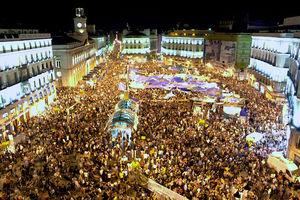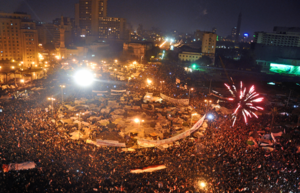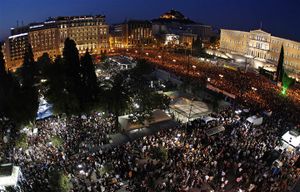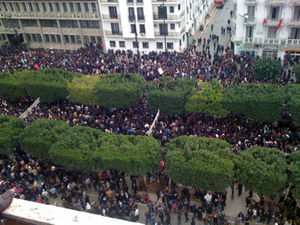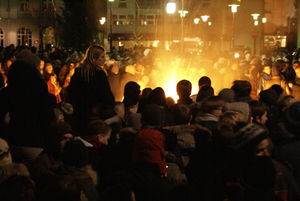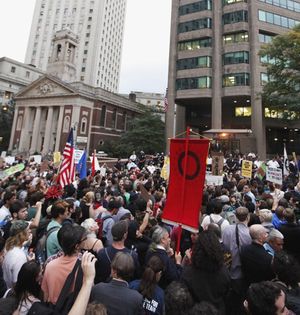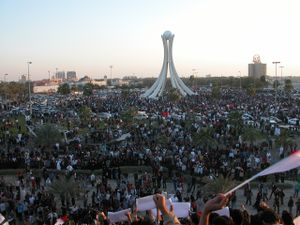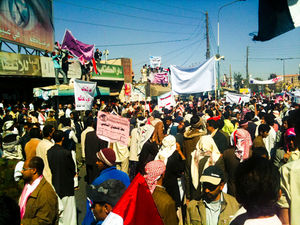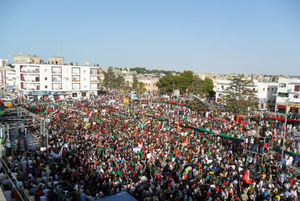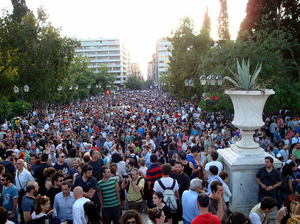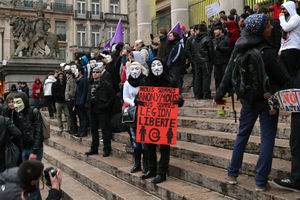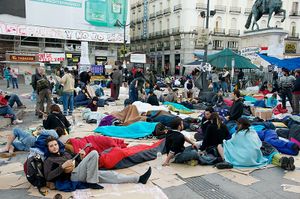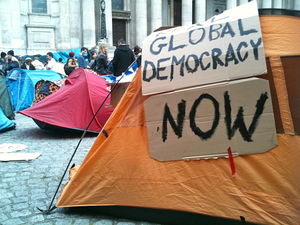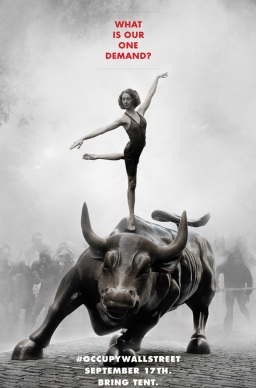Main Page: Difference between revisions
| (240 intermediate revisions by 10 users not shown) | |||
| Line 1: | Line 1: | ||
[[Image:IMG 2339.JPG|650px|thumb|Participants workshop March 21, 2011]] | |||
[[Image:Puertadelsol2011.jpg|300px|thumb|The Puerta del Sol square in Madrid May 2011]] | |||
[[Image:Tahrir Square on February11.png|300px|thumb|Celebrations in Tahrir Square, Cairo, 2011]] | |||
[[Image:2011 Greece Uprising.jpg|300px|thumb|Demonstrators in front of the Greek parliament, 29 May.]] | |||
[[Image:Tunisia Unrest - VOA - Tunis 14 Jan 2011 (2).jpg|300px|thumb|Protesters in downtown Tunis on 14 January 2011]] | |||
[[Image:W15 Protesters 1807.JPG|300px|thumb|300px|Iceland concentration 20 January 2009]] | |||
[[Image:Wallst14occupy.jpg|300px|thumb|300px|Protesters near the New York City Police Department, 2011]] | |||
[[Image:Protesters_gathering_in_Pearl_roundabout.jpg |300px|thumb|Protesters gathering in Pearl roundabout for the first time since the begging of the 2011 Bahraini uprising]] | |||
[[Image:Yemen protest.jpg|300px|thumb|Protest in Sanaa, Yemen (February 3, 2011)]] | |||
[[Image:Demonstration_in_Al_Bayda_(Libya,_2011-07-22).jpg|300px|thumb|Demonstration in Al Bayda Libya, 2011]] | |||
[[Image:Syntagma Square 'indignados'.png|300px|thumb|Demonstrators in the plaza in front of the Greek parliament, 25 May]] | |||
[[Image:Anonymous-Bruxelles.jpg|300px|thumb|Anonymous protestors at the Brussels Stock Exchange, Belgium, January 2012]] | |||
[[Image:Acampada Sol ph18.jpg|300px|thumb|right|Sol, 18 May, early morning]] | |||
[[Image:Occupy_London_Tent.jpg|300px|thumb|Occupy London Tent, 25 May 2011]] | |||
[[Image:Wall-Street-1.jpg|300px|thumb|Poster OWS 17 September 2011]] | |||
'''Workshop: Understanding the New Wave of Social Cooperation: A Triangulation of the Arab Revolutions, European Mobilizations and the American Occupy Movement'''<br> | |||
9:00am-5:15pm <br> | |||
March 21st, 2012 <br> | |||
Harvard University- Cambridge, MA (Boston) <br> | |||
Social media hashtag: '''#21M''' '''#occupyresearch''' IRC: #Berkman <br> | |||
= '''Introduction''' = | = '''Introduction''' = | ||
This one-day workshop | This one-day workshop brought together several groups of researchers: members of the Council for European Studies (CES) European Social Movements research network who were in Boston for the Council for European Studies conference (March 22 - 24); scholars at the Berkman Center; and researchers from institutions including the Harvard Kennedy School, MIT's Comparative Media Center, Northwest University and Boston College's'Movements/media Research and Action Project (MRAP). | ||
The workshop | The workshop was hosted in the Berkman Center at Harvard University and is organized in cooperation with the Council for European Studies (CES) European Social Movements research network and the collaboration of MIT Comparative media and Occupy Research. [[Organization credits]] | ||
'''Goals and Key Objectives''' | |||
At this event, we undertook a historically grounded comparative approach that attempted to place these protests and their corresponding forms of social cooperation in context and sought to establish an analytical and theoretical grounding for the study of these events. We did not only investigate each individual case, but also assessed the relationships (or lack thereof) between each of the respective cases. | |||
More specifically, the workshop analyzed the particular details associated with each national/regional case and identified and discussed any commonalities between them based on a 'triangulation' of current research and understanding on the Arab revolutions, European mobilizations and the American Occupy movement. To facilitate an interactive discussion on these topics during the event, the specific angle of each of the three planned sessions was defined around clusters of participants' interest: | |||
What | * '''EMERGING ORGANIZATIONAL FORMS AND DIGITAL TECHNOLOGIES''' | ||
Which organizational forms were adopted by the movements in each case? What is the role of social media in shaping these emerging forms? Are there similarities among the cases? What do these cases tell us about the conditions and organizational principles of collective action? | |||
* '''WHO MOBILIZED AND WITH WHICH GOALS AND STRATEGIES?''' | |||
What is the movement composition (i.e, who were the actors and what social bases were involved)? In terms of the actors what is the continuity with previous mobilization waves, such as the global justice movement? What were/are the visions and strategies of change in each of the cases? Is there a common political view or strategy among all the cases? What are the significant divisions between actors within each individual case? Are there similar divisions across different cases, and to what extent are the local and national dynamics important in shaping movement configuration? | |||
* '''EXPLANATORY FACTORS AND CONNECTIONS AMONG THE CASES''' | |||
Why did social mobilization happen in so many countries at once? Are there similar explanatory factors and historical trajectories that explain why mobilization took place? Is it legitimate to talk about a global wave of mobilization? If so, how are these different cases connected and how might we confirm and document the connections between movements? What are the mechanisms of diffusion and translation among the cases? | |||
'''Objectives:''' | |||
* | To achieve the overarching goal of "triangulating" of the current research and understanding on the Arab revolutions, European mobilizations and the American Occupy movement, our specific goals were: | ||
* Contextualize (both historically and from a socio-political perspective) the impact of digital tools in collective action by connecting the social movements studies tradition with the analysis of Internet-based phenomena, which required drawing connections among European, North American, and Arabic approaches to research and analysis. | |||
* Map and systematically organize existing research and expertise on the current wave of social cooperation and mobilization. | |||
* Exchange, share, and discuss current work and facilitate synergy among researchers on the topic. | |||
'''Format and methodology''' | |||
The workshop was intended as an exchange between researchers at the event rather than as an opportunity to disseminate information to other researchers or to the general public. To facilitate interaction among researchers, this workshop avoided conference-style presentations and instead was designed to foster dialogue among individuals working in this space. The format was mainly discussion-based around a series of questions, with the opportunity to share papers in advance of the event itself at this wiki. A maximum of 30 participants were expected at this highly-interactive event. | |||
For each session, a moderator introduced the theme followed by very short (5 minute) warm up presentations. Then all participants were invited to discuss any and all issues pertaining to the theme. Each session finalized by someone providing a synthesis of the discussion. For each session, we assigned a note taker and like tweeting. | |||
All workshop discussion were audio recorded for note taking purposes. Live streaming connexion were provided upon request. | |||
[[Schedule]] | |||
[[List of participants]] | |||
'''Contact''' Mayo Fuster Morell at mayofm(at)cyber.law.harvard.edu or Amar Ashar at ashar(at)cyber.law.harvard.edu | |||
= Workshop documentation = | |||
'''Notes sessions:''' | |||
* 9:30 am – 10:30 am EMERGING ORGANIZATIONAL FORMS AND DIGITAL TECHNOLOGIES and 10:45 am-11:45 am CONTINUATION EMERGING ORGANIZATIONAL FORMS AND DIGITAL TECHNOLOGIES: METHODOLOGICAL APPROACHES [https://docs.google.com/document/d/19VvvBKVGgsVTz1A2PsdobxDzo8mafs8L92e-VFOhOFw/edit Notes session] | |||
* 1:00 pm-2:30 pm WHO MOBILIZED AND WITH WHICH GOALS AND STRATEGIES? [https://docs.google.com/document/d/19VvvBKVGgsVTz1A2PsdobxDzo8mafs8L92e-VFOhOFw/edit Notes session] | |||
* | * 2:45 pm-4:15 pm EXPLANATORY FACTORS AND CONNECTIONS AMONG THE CASES [https://docs.google.com/document/d/1_Vv1G0EgTf0XF-r00c1aeTA3bLmLxRJnMAF21nQmZxE/edit Notes session] | ||
* 4:15 - 5:00 pm Final reflections and next steps: Theoretical Take-Aways and Ways to Rethink Research [https://docs.google.com/document/d/1-vGIN5aJw2mXh1JKoSH7MY5dC_AUj3tQ0hAr9J751Rg/edit Notes takes final session] | |||
* | |||
'''Slides:''' | |||
* | * Slides presentation Mayo Fuster Morell: [http://cyber.law.harvard.edu/21M12socialcooperation/sites/21M12socialcooperation/images/WorkshopMarch212012_MayoFM_Slides.pdf Emerging organizational forms and digital technologies: Spanish State case: “Indignated”/15M mobilization] | ||
'''Audio recording''' of the workshop could be provided upon request. | |||
== Map of case/participant == | |||
''' | '''USA Occupy movement''' (general): Beth Coleman, Maite Tapia, E. Colin Ruggero, Marcos Ancelovici, William A. (Bill) Gamson, Ofer Sharone, Pablo Rey, Dalida María Benfield, Nicole Doerr, Tim McCarthy, Martha Fuentes-Bautista | ||
* '''Boston''': Sasha Costanza-Chock, Pablo Rey, Nicole Doerr, Jeffrey Juris, Jason Pramas, Sandra Ray, Robert J. Wengronowitz, Gabriel Schaffzin | |||
* '''Pittburg''': Alice Mattoni | |||
* '''Philadelphia''': E. Colin Ruggero | |||
''' | '''Canada: Montreal''': Marcos Ancelovici | ||
'''Arab Spring''' (general): Rob Faris, Bruce Etling, Alicia Solow-Niederman, William A. (Bill) Gamson | |||
* '''Tunisia''': Zack Brisson | |||
* '''Egypt''': Lina Attalah, Zeynep Tufekci, Nagla Rizk, Alicia Solow-Niederman, Zack Brisson, Dalida María Benfield | |||
''' | '''South African Movements''': Nicole Doerr | ||
'''Israeli Summer''': William A. (Bill) Gamson | |||
''' | '''European dimension''': Cristina María Flesher Fominaya, Francesca Vassallo, Nicole Doerr, Alexander Trechsel | ||
* '''Spain''': Mayo Fuster Morell, Pablo Rey, Cristina María Flesher Fominaya, Marcos Ancelovici | |||
* '''Germany''': Nicole Doerr, Maite Tapia | |||
* '''Greece''': Maria Kousis, Sandra Ray | |||
* '''Italy''': Alice Mattoni | |||
* '''UK''': Maite Tapia | |||
*''' Ireland''': Laurence Cox France : Marcos Ancelovici, Francesca Vassallo | |||
*''' Poland''': Elzbieta Cizewska | |||
* '''France''': Marcos Ancelovici | |||
*''' Russia''': Rob Faris, Bruce Etling | |||
''' | '''Latino-america:''' | ||
* Venezuela: Martha Fuentes-Bautista | |||
[[Distribution of participants per topics]] | |||
= Bibliographic resources = | |||
Please add any relevant resource. | |||
== Arab Spring == | |||
"Faculty Insights", AUC Today, Spring 2011 http://www1.aucegypt.edu/publications/auctoday/AUCTodaySpring11/01_Faculty_Insights.htm | |||
Al-Malky, Rania 2007 Blogging for Reform: the Case of Egyp Arab Media and Society (February 2007) http://www.arabmediasociety.com/articles/downloads/20070312143716_AMS1_Rania_Al_Malky.pdf | |||
Alimi, Eitan Y. and David S. Meyer (2012) Seasons of Change: Arab Spring and Political Opportunities. Swiss Political Science Review. Special issue: http://dmmsclick.wiley.com/view.asp?m=0jcva5g0090vlet42smd&u=19087420&f=h | |||
Anderson, Jon 2003 New Media, New Publics: Reconfiguring the Public Sphere of Islam Social Research 70 (3):888-906 http://www.policyinnovations.org/ideas/policy_library/data/01338 | |||
Anderson, Lisa 2011 Demystifying the Arab Spring: Parsing the Differences Between Tunisia, Egypt, and Libya Foreign Affairs http://www.ssrresourcecentre.org/wp-content/uploads/2011/06/Anderson-Demystifying-the-Arab-Spring.pdf | |||
Aouragh, Miriyam and Anne Alexander. 2011. “The Egyptian experience.” International Journal of Communication (5): 1344-1358. | |||
Axelford, Barrie 2011 Talk about a Revolution: Social Media and the MENA Uprisings Globalizations (published by Global Studies Association of North America), Volume 8, Issue 5, 2011 (available via Taylor & Francis Online) http://www.tandfonline.com/doi/abs/10.1080/14747731.2011.621281#preview | |||
Babak Rahimi 2011 The Agonistic Social Media: Cyberspace in the Formation of Dissent and Consolidation of State Power in Postelection Iran The Communication Review http://www.tandfonline.com/doi/abs/10.1080/10714421.2011.597240 | |||
Brisson, Zack, & Krontiris, Kate (March, 2012). 'Tunisia: From Revolutions to Institutions' <http://dl.dropbox.com/u/53226669/Tunisia%201-2012-Publication-Web-%C6%92.pdf> World Bank Group | |||
Brisson, Zack, & Lee, Panthea (March, 2011). 'Egypt: From Revolutions to Institutions'<http://thereboot.org/wp-content/Egypt/Reboot-Egypt-From-Revolutions-To-Institutions.pdf> | |||
Chebib, Nadine Kassem and Rabia Minatullah Sohail 2011 The Reasons Social Media Contributed To The 2011 Egyptian Revolution International Journal of Business Research and Management (IJBRM), Volume (2) : Issue (3) : 2011 http://www.cscjournals.org/csc/manuscript/Journals/IJBRM/volume2/Issue3/IJBRM-52.pdf | |||
Compilation of authors; Edited by Marc Lynch, Susan B. Glasser, and Blake Hounshell 2011 [e-book] Revolution in the Arab World: Tunisia, Egypt and the Unmaking of an Era Foreign Policy http://www.foreignpolicy.com/ebooks/revolution_in_the_arab_world | |||
Cottle, Simon 2011 Media and the Arab uprisings of 2011: Research notes Journalism, July 2011; 12 (5) http://www.contexting.me/files/CottleMediaandtheArabUprising.pdf | |||
Diani, Mario (2012) Networks and Internet into Perspective. Swiss Political Science Review. Special issue: http://dmmsclick.wiley.com/view.asp?m=0jcva5g0090vlet42smd&u=19087420&f=h | |||
Dupont, Cédric, Florence Passy 2011 Debate: The Arab Spring or How to Explain those Revolutionary Episodes? Swiss Political Science Review, Volume 17, Issue 4, pages 447–451, December 2011 http://onlinelibrary.wiley.com/doi/10.1111/j.1662-6370.2011.02037.x/abstract | |||
=== | Eickelman, Dale 2005 New Media in the Arab Middle East and the Emergence of Open Societies in Remaking Muslim Politics ed. Robert Hefner 2005, Princeton University Press http://books.google.com/books?hl=en&lr=&id=MmmVMCBej8oC&oi=fnd&pg=PA37&dq=%22new+media+in+the+arab+middle+east%22&ots=VVVYG9YiIe&sig=Z8J5mbCrhB5slmusWY4GlY20q20#v=onepage&q=%22new%20media%20in%20the%20arab%20middle%20east%22&f=false | ||
Ellis, Christopher J., John Fender 2010 Information Cascades and Revolutionary Regime Transitions The Economic Journal http://onlinelibrary.wiley.com/doi/10.1111/j.1468-0297.2010.02401.x/abstract | |||
Eltantawy, Nahed, Julie B. Wiest 2011 Social Media in the Egyptian Revolution: Reconsidering Resource Mobilization Theory International Journal of Communication http://ijoc.org/ojs/index.php/ijoc/article/view/1242 | |||
eMarketing Egypt 2011 Facebook in Egypt:e-marketing insights August 2011 Gartner Research N/A | |||
Farrell, Henry N/A The Internet's Consequences for Politics Not yet published; posted online at Crooked Timber Blog crookedtimber.org/wp-content/uploads/2011/09/ARPS.pdf | |||
Gamson, William A. (2012) Arab Spring, Israeli Summer, and the Process of Cognitive Liberation. Swiss Political Science Review. Special issue: http://dmmsclick.wiley.com/view.asp?m=0jcva5g0090vlet42smd&u=19087420&f=h | |||
Ghannam, Jeffrey 2011 Social Media in the Arab World: Leading up to the Uprisings of 2011 Center for International Media Assistance http://cima.ned.org/publications/social-media-arab-world-leading-uprisings-2011-0 | |||
=== | Goldstone, Jack A. (2012) Cross-class Coalitions and the Making of the Arab Revolts of 2011. Swiss Political Science Review. Special issue: http://dmmsclick.wiley.com/view.asp?m=0jcva5g0090vlet42smd&u=19087420&f=h | ||
Goodwin, Jeff. (2012) Why We Were Surprised (Again) by the Arab Spring. Swiss Political Science Review. Special issue: http://dmmsclick.wiley.com/view.asp?m=0jcva5g0090vlet42smd&u=19087420&f=h | |||
Howard, P. 2010 [Book] The Digital Origins of Dictatorship and Democracy: Information Technology and Political Islam Oxford University Press, 2010 http://faculty.washington.edu/pnhoward/publishing/internetislam/internetislam.html | |||
Howard, Philip N. Aiden Duffy, Deen Freelon, Muzammil Hussain, Will Mari, and Marwa Mazaid 2011 Opening Closed Regimes: What Was the Role of Social Media During the Arab Spring? Project on Information Technology & Political Islam (pITPI) http://pitpi.org/index.php/2011/09/11/opening-closed-regimes-what-was-the-role-of-social-media-during-the-arab-spring/ | |||
International Journal of Communication (Vol. 5), http://ijoc.org/ojs/index.php/ijoc | |||
Iqbal, Zubair 2011 Are Democratic Revolts Contagious? Implications for the Arab World Middle East Institute http://www.mei.edu/content/are-democratic-revolts-contagious-implications-arab-world | |||
Kabir, Nahid Afrose 2011 Egypt's Arab Spring: will the flowers blossom? University of South Australia International Centre for Muslim and non-Muslim Understanding http://www.unisa.edu.au/muslim-understanding/documents/kabir-egypts-arab-spring.pdf | |||
Khamis, Dr. Sahar and Katherine Vaughn 2011 Cyberactivism in the Egyptian Revolution: How Civic Engagement and Citizen Journalism Tilted the Balance Published in Issue 13 of Arab Media and Society (Formerly TBS Journal), Summer 2011 http://www.arabmediasociety.com/?article=769 | |||
Khondker, Habibul Haque 2011 Role of the New Media in the Arab Spring Globalizations (published by Global Studies Association of North America), Volume 8, Issue 5, 2011 (available via Taylor & Francis Online) http://www.tandfonline.com/doi/abs/10.1080/14747731.2011.621287 | |||
Laipson, Ellen (project director); Courtney C. Radsch (author) 2011 Blogosphere and Social Media (pp. 67-81) Seismic Shift: Understanding Change in the Middle East http://www.stimson.org/images/uploads/research-pdfs/Blogosphere_and_Social_Media.pdf | |||
Lotan, Gilad et al. 2011. “The revolutions were tweeted.” International Journal of Communications 5: 1375-1405. | |||
Lotan, Gilad, Erhardt Graeff, Mike Ananny, Devin Gaffney, Ian Pearce, danah boyd 2011 The Revolutions Were Tweeted: Information Flows During the 2011 Tunisian and Egyptian Revolutions International Journal of Communication http://ijoc.org/ojs/index.php/ijoc/article/view/1246 | |||
Lynch, Marc 2011 After Egypt: The Limits and Promise of Online Challenges to the Authoritarian Arab State Perspectives on Politics (2011), 9 : pp 301-310 http://www.marclynch.com/wp-content/uploads/2011/06/download-Lynch-article.pdf | |||
Lynch, Marc 2007 Blogging the New Arab Public Arab Media and Society (February 2007) http://www.arabmediasociety.com/articles/downloads/20070312155027_AMS1_Marc_Lynch.pdf | |||
Lysenkoa, Volodymyr V. Kevin C. Desouzab 2012 Moldova's internet revolution: Analyzing the role of technologies in various phases of the confrontation Technological Forecasting and Social Change, via Science Direct http://www.sciencedirect.com/science/article/pii/S0040162511001223 | |||
Malcolm Gladwell’s blog post on The New Yorker website, “Does Egypt Need Twitter?” www.newyorker.com (accessed November 11, 2011). | |||
Murphy, Emma C. 2009 Theorizing ICTs in the Arab World: Informational Capitalism and the Public Sphere International Studies Quarterly 53, p. 1131-1153 http://onlinelibrary.wiley.com/doi/10.1111/j.1468-2478.2009.00571.x/pdf | |||
Musleh, Abeer 2012 Mobilizing during the Arab Revolutions: Palestinian Youth Speak for Themseleves. In Tejerina, B. and I. Perugorría (Eds.) From Social to Political. New Forms of Mobilization and Democratization, Bilbao: Servicio Editorial de la Universidad del País Vasco. Email: abmusleh@gmail.com | |||
Nanabhay, Mohamed and Roxane Farmanfarmaian 2011 From spectacle to spectacular: How physical space, social media and mainstream broadcast amplified the public sphere in Egypt's ‘Revolution’ The Journal of North African Studies http://dx.doi.org/10.1080/13629387.2011.639562 | |||
Nepstad, Sharon Erickson (2012) Nonviolent Resistance in the Arab Spring: The Critical Role of Military-Opposition Alliances. Swiss Political Science Review. Special issue:http://dmmsclick.wiley.com/view.asp?m=0jcva5g0090vlet42smd&u=19087420&f=h | |||
Networks and Internet into Perspective" Swiss Political Science Review 17(4): 469–47 http://onlinelibrary.wiley.com/doi/10.1111/j.1662-6370.2011.02040.x/pdf | |||
Schneider, Cathy Lisa (2012) Violence and State Repression.Swiss Political Science Review. Special issue: http://dmmsclick.wiley.com/view.asp?m=0jcva5g0090vlet42smd&u=19087420&f=h | |||
Skinner, Julia 2011 Social Media and Revolution: The Arab Spring and the Occupy Movement as Seen through Three Information Studies Paradigms Sprouts Working Papers on Information Systems http://sprouts.aisnet.org/11-169/ | |||
Stephan, Maria J. 2011 Revolution and Political Transformation in the Middle East: Outcomes and Prospects, Volume 3 Middle East Institute http://www.mei.edu/content/introduction-revolution-and-political-transformation-middle-east-outcomes-and-prospects-vol | |||
Tufekci, Zaynep. 2011. “Too many messages and only one Facebook page.” Technosociology. Blog posted on September 19, 2011. http://technosociology.org, accessed November 11, 2011. | |||
Tufekci, Zaynep. 2011. “New media and the people-powered uprisings.” Technology Review. Blog posted on August 30, 2011. www.technologyreview.com/blog/guest/27122/, accessed November 11, 2011. | |||
Tufekci, Zeynep 2011 New Media and the People-Powered Uprisings MIT Technology Review http://www.technologyreview.com/blog/guest/27122/ | |||
Tufekci, Zeynep N/A; publication forthcoming The New Media Ecology and the Dynamics of Collective Action and Repression Under Autocracies Draft provided to Berkman Center team; publication forthcoming in Journal of Communication N/A; draft provided to Berkman Center team; please see Berkman webcast 'From Tehran to Tahrir: Social Media and Dynamics of Collective Action under Authoritarian Regimes,' available at http://cyber.law.harvard.edu/events/luncheon/2011/09/tufekci | |||
Tufekci, Zeynep (2011) Video presentation http://cyber.law.harvard.edu/people/zeynep & http://technosociology.org/ Keywords/themes: Collective action and technology Focus cases: Arab Spring (Egypt) Related work: Video presentation: From Tehran to Tahrir: Social Media and Dynamics of Collective Action under Authoritarian Regimes http://cyber.law.harvard.edu/events/luncheon/2011/09/tufekci | |||
Wilson, Christopher and Alexandra Dunn. 2011a. “Digital media in the Egyptian revolution.” International Journal of Communication 5: 1248-1272. | |||
Wilson, Christopher, Alexandra Dunn 2011 Digital Media in the Egyptian Revolution: Descriptive Analysis from the Tahrir Data Set International Journal of Communication http://ijoc.org/ojs/index.php/ijoc/article/view/1180 | |||
Zunes, Stephen 2011 Revolution and Political Transformation in the Middle East: Agents of Change, Volume 1 Middle East Institute http://www.mei.edu/content/revolution-and-political-transformation-middle-east-agents-change | |||
Zunes, Stephen 2011 Revolution and Political Transformation in the Middle East: Government Action and Response, Volume 2 Middle East Institute http://www.mei.edu/content/introduction-revolution-and-political-transformation-middle-east-government-action-and | |||
'''BLOG POSTS ARAB CASES: ''' | |||
Carvin, Andy 2011 Online Reports Detail Chaos, Deaths in Tunisia; Add Yours NPR.org Jan 13 http://www.npr.org/blogs/thetwo-way/2011/01/13/132888992/tunisia-protests-social-media | |||
Eltahawy, Mona 2010 Facebook, Youtube, and Twitter are The New Tools of Protest in the Arab World Washington Post, August 7 2010 http://www.washingtonpost.com/wp-dyn/content/article/2010/08/06/AR2010080605094.html | |||
Gallagher, Ian 2011 Egyptian police use Facebook and Twitter to track down protesters' names before 'rounding them up' Daily Mail London 2011 http://www.dailymail.co.uk/news/article-1354096/Egypt-protests-Police-use-Facebook-Twitter-track-protesters.html | |||
Greenberg, Andy 2011 As Egyptians Reconnect, Their Government Will Be Watching Forbes.com 2011 http://www.forbes.com/sites/andygreenberg/2011/02/04/as-egyptians-reconnect-their-government-will-be-watching/ | |||
Hirschkind, Charles 2011 The Road to Tahrir Social Science Research Council http://blogs.ssrc.org/tif/2011/02/09/the-road-to-tahrir/ | |||
Levinson, Charles and Margaret Croker 2011 The Secret Rally That Sparked an Uprising Wall Street Journal Feb 2011 http://online.wsj.com/article/SB10001424052748704132204576135882356532702.html | |||
Masoud, Tarek 2011 An Exit Plan for Mubarak New York Times http://www.nytimes.com/2011/02/04/opinion/04masoud.html | |||
Masoud, Tarek 2011 U.S. must back democracy in Egypt regardless Los Angeles Times http://articles.latimes.com/2011/feb/09/opinion/la-oe-masoud-egypt-20110209 | |||
May, Michelle 2011 How the Egyptian Revolution Inspired Protests in Spain PBS Media Shift: Social Networking http://www.pbs.org/mediashift/2011/06/how-the-egyptian-revolution-inspired-protests-in-spain161.html | |||
Mccormick, Ty 2011 The Road to Tahrir (Foreign Policy) Foreign Policy August 18 2011 http://www.foreignpolicy.com/articles/2011/08/18/the_road_to_tahrir | |||
Mostak, Todd 2011 Tarek Masoud discusses the dynamics of Egypt's Revolution Harvard University Center for Middle Eastern Studies http://cmes.hmdc.harvard.edu/node/2427 | |||
N/A; Gulf Stream Blog 2011 Tunisia's Wikileaks Revolution? Harvard Kennedy School Belfer Center Gulfstream: Analysis from the Dubai Initative http://middleeastinthenews.wordpress.com/2011/01/15/tunisias-wikileaks-revolution/ | |||
N/A; Gulf Stream Blog 2011 When the People Rise Up: Egypt's Massive Protests and Their Unpredictable Outcomes Harvard Kennedy School Belfer Center Gulfstream: Analysis from the Dubai Initative http://middleeastinthenews.wordpress.com/2011/01/25/when-the-people-rise-up-egyptian-massive-protests-and-the-unpredictable-outcomes/ | |||
N/A; Gulf Stream Blog 2011 When the People Rise Up: When the People Rise Up: Lessons from Tunisia Harvard Kennedy School Belfer Center Gulfstream: Analysis from the Dubai Initative http://middleeastinthenews.wordpress.com/2011/01/25/when-the-people-rise-up-lessons-from-tunisia/ | |||
== Spanish "Indignatos"/15M == | |||
Fuster Morell, M (2011) Video presentation: The Spanish Revolution & the Internet: From free culture to meta-politics http://cyber.law.harvard.edu/events/luncheon/2011/11/morell | |||
Fuster Morell, M. & Subirats, J. (2012). Més enllà d'Internet com a eina "martell” - eina de la vella política: Cap un nou Policy Making?. Els casos del Moviment de Cultura Lliure i pel Procomú Digital i el 15M a Catalunya (Beyond the Internet as a tool "hammer" - tool of the old politics: Towards a New Policy Making?. Cases the Free Culture Movement and the digital commons and 15M in Catalonia). Research report. Institute de Govern i Politiques Publiques (UAB) per l'Escola d'Administracio Publica de Catalunya. (139 pages) | |||
Postill, John. n.d. “Democracy in an age of viral reality,” unpublished manuscript submitted to special edition of Ethnography “Media Ethnography and Public Sphere Engagement,” edited by Debra Vidali and Thomas Tufte. | |||
Taibo, Carlos. 2011. El 15-M en sesenta preguntas. Madrid: Los libros de la Catarata. | |||
Toret, Javier (2011) Una mirada tecnopolítica sobre los primeros días del #15M .http://civilsc.net/node/14 | |||
Jornadas Seminario de “Comunicación y Sociedad Civil” de la UOC-IN3: http://civilsc.net/ | |||
Purmar, Victor (2012) Los indignados cumplen un año. El éxito tangible del 15M http://www.unitedexplanations.org/2012/03/21/los-indignados-cumplen-un-ano-el-exito-tangible-del-15m/ | |||
== | == Occupy Wall Street == | ||
* | American Ethnologist's (AE) May 2012 issue (Volume 39, Issue 2) features three open-access articles on the Occupy movements (by Jeffrey Juris, Maple Razsa/Andrej Kurnik, and David Nugent). ***Photos, abstracts, and direct links to the articles are available on AE's website: http://www.americanethnologist.org Click on the Occupy article titles and you will be taken to the abstracts (and accompanying photos), and at the end of the abstracts you will find live open access links to the full article PDFs in the Wiley-Online Library. 1) Maple Razsa and Andrej Kurnik, "The Occupy Movement in Žižek’s hometown: Direct democracy and a politics of becoming". 2) Jeffrey S. Juris, "Reflections on #Occupy Everywhere: Social media, public space, and emerging logics of aggregation". 3) David Nugent, "Commentary: Democracy, temporalities of capitalism, and dilemmas of inclusion in Occupy movements" | ||
* ' | |||
Adbusters call to occupy wall street: www.adbusters.org/blogs/adbusters-blog/occupywallstreet.html (accessed October 24, 2011). | |||
Costanza-Chock, Sasha (2012) Video presentation Media Culture in the Occupy Movement: http://vimeo.com/groups/occupyvideo/videos/37833652 | |||
Collins, Joan. 2012. "Theorizing Wisconsin's 2011 Protests." American Ethnologist 39(1): 1-15. | |||
Collins, Randall. 2001. “Social movements and the focus of emotional attention.” In Passionate Politics, edited by Jeff Goodwin, James M. Jasper and Francesca | |||
Polletta, 27–44. Chicago, IL: The University of Chicago Press. | |||
Hector R. Cordero-Guzman, "Main Stream Support for a Mainstream Movement, The 99% Movement Comes From and Looks Like the 99%, Profile of web traffic taken from occupywallstreet.org," October 19, 2011, http://occupywallst.org (accessed January 4, 2011). | |||
Graeber, David. 2011. "On Playing By the Rules—The Strange Success of #OccupyWallStreet,"http://www.nakedcapitalism.com (accessed January 4, 2012). | |||
'' | Hardt, Michael and Antonio Negro. 2011. "The Fight for 'Real Democracy' at the Heart of Occupy Wall Street." - (October 11), www.foreignaffairs.com (accessed January 5, 2012). | ||
Milan, Stefania. 2011. “Cloud protesting.” Blog posted on October 18, 2011. http://stefi.engagetv.com/node/103, accessed November 11, 2011. | |||
Gamson, Bill. (2012) [http://cyber.law.harvard.edu/21M12socialcooperation/sites/21M12socialcooperation/images/Gamson_010212CulturalOutcomesOccupyMovement.doc Cultural Outcomes of the Occupy Movement]. December 30, 2011 [with changes added: January 2, 2012] | |||
Rinke, Einke M. and Maria Röder. 2011. “Media ecologies, communication culture, and temporal-spatial unfolding.” International Journal of Communication 5: 1273-1285. | |||
Costanza-Chock, Sasha 2010 [Dissertation] Se Ve, Se Siente: Transmedia Mobilization in the Los Angeles Immigrant Rights Movement USC Annenberg School of Communication 2010 Completed Dissertions http://annenberg.usc.edu/Research/Student/Dissertations/Completed10/Costanza-ChockS.aspx | |||
Schradie, Jen. 2011. "Why Tents (Still) Matter for the Occupy Movement," www.commondreams.org (January 4, 2012). | |||
Suresh, Fernando Occupy Vancouver Organizer on Dec 27, 2011Occupy My Soul by http://thenextedge.org/2011/12/occupy-my-soul/ | |||
Ruggero, E, Colin (2011). "Spirit of ’76: Occupy Philadelphia, Voicelessness, and the Challenge of Growing the Occupy Wall Street Movement" Deliberately Considered, November 2011. Blog post: [http://www.deliberatelyconsidered.com/2011/11/spirit-of-%E2%80%9976-occupy-philadelphia-voicelessness-and-the-challenge-of-growing-the-occupy-wall-street-movement/] | |||
Gamson, Bill. (2012) Boston College Cultural Outcomes of the Occupy Movement. December 30, 2011 [with changes added: January 2, 2012] | |||
'' | ''Blogs on OWS:'' | ||
Meyer David's Blog: http://politicsoutdoors.com/tag/occupy/ and http://politicsoutdoors.com/tag/occupy-wall-street/; | |||
The Center for the Study of Social Movements at the University of Notre Dame <http://cssm.nd.edu/>: http://mobilizingideas.wordpress.com/tag/occupy-movement/; | |||
Foreign Affairs articles on OWS: http://www.foreignaffairs.com/node/133733. | |||
== Russia == | |||
By John Kelly, Vladimir Barash, Karina Alexanyan, Bruce Etling, Robert Faris, Urs Gasser, and John Palfrey “Mapping Russian Twitter” <http://cyber.law.harvard.edu/publications/2012/mapping_russian_twitter> | |||
= | == Comparison of several cases == | ||
Ancelovici, Marcos (2012) “Le mouvement Occupy et la question des inégalités: Ce que le slogan ‘Nous sommes les 99 %’ dit et ne dit pas.” In F. Dupuis-Déri, ed. Par dessus le marché! Rélexions critiques sur le capitalisme. Montreal: Écosociété. [http://ancelovici.files.wordpress.com/2012/03/le-mouvement-occupy-et-la-question-des-inc3a9galitc3a9s-ancelovici.pdf] | |||
Rey, Pablo (2011) Gallery of different twitter-newspaper visualizations. http://numeroteca.org/cat/frontpage-newspaper/ | |||
Occupy research: | Rey, Pablo (2011) Post: Analyzing newspapers’ front pages to interpret the Mainstream Media ecology. Researching the #15M, #Occupy movement and the Arab Spring. Interested in the relationship between Mainstream Media and social Media(Twitter): http://civic.mit.edu/blog/pablo/analyzing-newspapers-front-pages | ||
Gamson, William A. (2012) Arab Spring, Israeli Summer, and the Process of Cognitive Liberation. Swiss Political Science Review. Special issue: http://dmmsclick.wiley.com/view.asp?m=0jcva5g0090vlet42smd&u=19087420&f=h | |||
USA - SPAIN | |||
Fuster Morell, M (2012) Blog post Report on OWS Forum on the commons: http://www.onlinecreation.info/?p=492 | |||
== Theory == | |||
Aday, Sean, Harry Farrell, Marc Lynch, and John Sides 2010 Special Report: Advancing New Media Research United States Institute of Peace http://www.usip.org/publications/advancing-new-media-research | |||
Aday, Sean, Harry Farrell, Marc Lynch, John Sides, John Kelly, & Ethan Zuckerman 2010 Blogs and Bullets: New Media in Contentious Politics United States Institute of Peace http://www.usip.org/publications/blogs-and-bullets-new-media-in-contentious-politics | |||
Bajpai, Kartikeya and Anuj Jaiswal 2011 A Framework for Analyzing Collective Action Events on Twitter Proceedings of the 8th International ISCRAM Conference--Lisbon, Portugal, May 2011 www.iscramlive.org/ISCRAM2011/proceedings/papers/119.pdf | |||
Benkler, Yochai 2006 (hardcover publication) The Wealth of Networks: How Social Production Transforms Markets and Freedom (see especially Chapter 7, "Political Freedom Part 2: Emergence of the Networked Public Sphere" Creative Commons Attribution Noncommercial Sharealike License http://cyber.law.harvard.edu/wealth_of_networks/Main_Page#Reviews_and_Blogs | |||
Castells, Manuel 2009 Communication Power Palo Alto, CA: Stanford University Press Book reviews are available at: http://mcs.sagepub.com/content/32/6/1043.full.pdf+html?rss=1 (published in the journal Media Culture Society) or http://www.tandfonline.com/doi/pdf/10.1080/10584609.2010.517097 (published in the journal Political Communication) | |||
Couldry, Nick, James Curran (eds.); W. Lance Bennett (author) 2003 Chapter 2: New Media Power: The Internet and Global Activism Contesting media power: alternative media in a networked world (book) http://depts.washington.edu/ccce/assets/documents/pdf/newmediapower.pdf | |||
della Porta, Donatella Sidney Tarrow (eds). (2005) Transnational Protest and Global Activism, New York, Rowman and Littlefield. | |||
della Porta, Donatella (ed.), 2009. Democracy in Social Movements, Houndsmill, Palgrave. | |||
Diamond, Larry 2010 Liberation Technology Journal of Democracy 21(3):69-83 http://muse.jhu.edu/journals/journal_of_democracy/v021/21.3.diamond.html | |||
Earle, Lucy 2011 Literature Review on the Dynamics of Social Movements in Fragile and Conflict-Affected States Emerging Issues Research Service of the Governance and Social Development Resource Centre (GSDRC) www.gsdrc.org/docs/open/EIRS13.pdf | |||
Edmond, Chris 2011 Information Manipulation, Coordination, and Regime Change The National Bureau of Economic Research http://www.nber.org/papers/w17395.pdf | |||
Goldstone, Jack 2011 Understanding the Revolutions of 2011 Foreign Affairs http://www.foreignaffairs.com/articles/67694/jack-a-goldstone/understanding-the-revolutions-of-2011 | |||
Goldstone, Jack Ted Robert Gurr and Farrokh Moshiri, eds. 1991 [Book] Revolutions of the Late Twentieth Century Boulder: Westview Press, 1991 No eBook available | |||
González-Bailón, "Sandra , Javier Borge-Holthoefer, Alejandro Rivero & Yamir Moreno" 2011 The Dynamics of Protest Recruitment through an Online Network Scientific Reports 1, Article number: 197, December 2011 http://www.nature.com/srep/2011/111215/srep00197/full/srep00197.html | |||
Huntington, Samuel P. 1991 [Book] The Third Wave: Democratization in the Late Twentieth Century Norman, OK: University of Oklahoma Press, 1991 No eBook available | |||
McAdam, D., Sidney Tarrow and Charles Tilly 2001 Dynamics of Contention New York, Cambridge University Press, 2001 http://site.ebrary.com.library.aucegypt.edu:2048/lib/aucairo/docDetail.action?docID=10005733 | |||
Meier, Patrick 2011 Chapter 2: From Evidence to Model in Do "Liberation Technologies" Change the Balance of Power Between Repressive Regimes and Civil Society? DRAFT DRAFT of Stanford University thesis http://irevolution.files.wordpress.com/2011/11/meier-dissertation-final.pdf | |||
Mourtada, R. and Fadi Salem (2011) Produced by DSG’s Governance and Innovation Program and co-authored by Racha Mourtada and Fadi Salem 2011 Facebook Usage: Factors and Analysis Dubai School of Government, Arab Social Media Report, Vol. 1, Issue 1, Jan. 2011 http://www.dsg.ae/NEWSANDEVENTS/UpcomingEvents/ASMRHome.aspx | |||
Mourtada, R. and Fadi Salem Produced by DSG’s Governance and Innovation Program and co-authored by Racha Mourtada and Fadi Salem 2011 Civil Movements: The Impact of Facebook and Twitter Dubai School of Government, Arab Social Media Report, Vol. 1, Issue 2, May 2011 http://www.dsg.ae/NEWSANDEVENTS/UpcomingEvents/ASMROverview2.aspx | |||
Neumayer, Christina and Celina Raffl 2008 Facebook for Global Protest: The Potential and Limits of Social Software for Grassroots Activism Prato CIRN 2008 Community Infomatics Conference: ICTs for Social Inclusion: What is the Reality? Refereed Paper http://pep-forums.990086.n3.nabble.com/file/n2539001/2008-Neumayer-Raffl-Facebook_protest_FARC.pdf | |||
Rhue, Lauren, Arun Sundararajan 2011 Digital Access, Political Networks and the Diffusion of Democracy SSRN, NYU Working Paper No. CEDER-11-03 http://papers.ssrn.com/sol3/papers.cfm?abstract_id=1892669 | |||
Rinke, Eike M. and Maria Röder 2011 Media Ecologies, Communication Culture, and Temporal-Spatial Unfolding: Three Components in a Communication Model of the Egyptian Regime Change International Journal of Communication http://mkw.uni-mannheim.de/prof_dr_hartmut_wessler/eike_rinke/rinke_roeder/rinke_roeder.pdf | |||
Robert Gurr, Ted 1970 Why Men Rebel Princeton: Princeton University Press, 1970 No eBook available | |||
Ruth Kricheli, Yair Livne, and Beatriz Magaloni 2011 Taking to the Streets: Theory and Evidence on Protests under Authoritarianism Stanford University's Center on Development, Democracy, and the Rule of Law (CDDRL), Program on Poverty and Governance Project http://cddrl.stanford.edu/publications/taking_to_the_streets_theory_and_evidence_on_protests_under_authoritarianism/ | |||
Senger, Dustin (with Dr. Cynthia Suopis) 2010 Can Social Media Spread Democracy? A Review of Literature dustinsenger.com www.dustinsenger.com/publications/report/Social_Media_Democracy.pdf | |||
Shehata, Dina 2011 The Fall of the Pharaoh Foreign Affairs http://www.foreignaffairs.com/articles/67687/dina-shehata/the-fall-of-the-pharaoh | |||
Shirky, Clay 2008 Here comes everybody: the power of organizing without organizations New York, Penguin, 2008 http://books.google.com/books/about/Here_comes_everybody.html?id=mafZyckH_bAC | |||
Spier, Shaked 2011 CollectiveAction 2.0: The Impact of ICT-Based Social Media on Collective Action – Difference in Degree or Difference in Kind? Humboldt-Universität zu Berlin http://edoc.hu-berlin.de/master/spier-shaked-2011-08-15/PDF/spier.pdf | |||
Zimbra, A. Abbasi, and H. Chen 2010 A Cyber-archaeology Approach to Social Movement Research: Framework and Case Study Journal of Computer-Mediated Communication http://onlinelibrary.wiley.com/doi/10.1111/j.1083-6101.2010.01531.x/abstract | |||
'''Blog posts theory:''' | |||
Esfandiari, Golnaz 2010 The Twitter Devolution Foreign Policy June 7 2010 http://www.foreignpolicy.com/articles/2010/06/07/the_twitter_revolution_that_wasnt | |||
Gladwell, Malcolm and Clay Shirky 2011 From Innovation to Revolution: Do Social Media Make Protests Possible? Foreign Affairs http://www.foreignaffairs.com/articles/67325/malcolm-gladwell-and-clay-shirky/from-innovation-to-revolution | |||
Shirky, Clay 2011 The Political Power of Social Media: Technology, the Public Sphere, and Political Change Foreign Affairs http://www.foreignaffairs.com/articles/67038/clay-shirky/the-political-power-of-social-media | |||
== Others == | |||
Bauwens, Michel 'Occupy' as a business model: The emerging open-source civilisation. The Occupy Wall Street movement is a model for a new economic paradigm, in which value is first created by communities. http://www.aljazeera.com/indepth/opinion/2012/03/2012361233474499.html | |||
Observatorio Metropolitano (Octubre 2011). Crisis y revolucion en Europa. Traficantes de suenyos: Madrid. (Spanish) | |||
http://traficantes.net/index.php/editorial/catalogo/otras/Crisis-y-revolucion-en-Europa | |||
''This analysis by Observatorio Metropolitano (October 2011) links the social mobilizaions from northern Africa and Europe.'' | |||
Occupy research resources: | |||
* http://occupyresearch.wikispaces.com/ | * http://occupyresearch.wikispaces.com/ | ||
* Zotero Group: https://www.zotero.org/groups/occupyresearch | * Zotero Group: https://www.zotero.org/groups/occupyresearch | ||
Chinese Government Reaction to OWS by newmediadev2011 http://newmediadev2011.wikischolars.columbia.edu/Chinese+Government+Reaction+to+OWS | |||
Latest revision as of 13:30, 18 June 2012
Workshop: Understanding the New Wave of Social Cooperation: A Triangulation of the Arab Revolutions, European Mobilizations and the American Occupy Movement
9:00am-5:15pm
March 21st, 2012
Harvard University- Cambridge, MA (Boston)
Social media hashtag: #21M #occupyresearch IRC: #Berkman
Introduction
This one-day workshop brought together several groups of researchers: members of the Council for European Studies (CES) European Social Movements research network who were in Boston for the Council for European Studies conference (March 22 - 24); scholars at the Berkman Center; and researchers from institutions including the Harvard Kennedy School, MIT's Comparative Media Center, Northwest University and Boston College's'Movements/media Research and Action Project (MRAP).
The workshop was hosted in the Berkman Center at Harvard University and is organized in cooperation with the Council for European Studies (CES) European Social Movements research network and the collaboration of MIT Comparative media and Occupy Research. Organization credits
Goals and Key Objectives
At this event, we undertook a historically grounded comparative approach that attempted to place these protests and their corresponding forms of social cooperation in context and sought to establish an analytical and theoretical grounding for the study of these events. We did not only investigate each individual case, but also assessed the relationships (or lack thereof) between each of the respective cases.
More specifically, the workshop analyzed the particular details associated with each national/regional case and identified and discussed any commonalities between them based on a 'triangulation' of current research and understanding on the Arab revolutions, European mobilizations and the American Occupy movement. To facilitate an interactive discussion on these topics during the event, the specific angle of each of the three planned sessions was defined around clusters of participants' interest:
- EMERGING ORGANIZATIONAL FORMS AND DIGITAL TECHNOLOGIES
Which organizational forms were adopted by the movements in each case? What is the role of social media in shaping these emerging forms? Are there similarities among the cases? What do these cases tell us about the conditions and organizational principles of collective action?
- WHO MOBILIZED AND WITH WHICH GOALS AND STRATEGIES?
What is the movement composition (i.e, who were the actors and what social bases were involved)? In terms of the actors what is the continuity with previous mobilization waves, such as the global justice movement? What were/are the visions and strategies of change in each of the cases? Is there a common political view or strategy among all the cases? What are the significant divisions between actors within each individual case? Are there similar divisions across different cases, and to what extent are the local and national dynamics important in shaping movement configuration?
- EXPLANATORY FACTORS AND CONNECTIONS AMONG THE CASES
Why did social mobilization happen in so many countries at once? Are there similar explanatory factors and historical trajectories that explain why mobilization took place? Is it legitimate to talk about a global wave of mobilization? If so, how are these different cases connected and how might we confirm and document the connections between movements? What are the mechanisms of diffusion and translation among the cases?
Objectives:
To achieve the overarching goal of "triangulating" of the current research and understanding on the Arab revolutions, European mobilizations and the American Occupy movement, our specific goals were:
- Contextualize (both historically and from a socio-political perspective) the impact of digital tools in collective action by connecting the social movements studies tradition with the analysis of Internet-based phenomena, which required drawing connections among European, North American, and Arabic approaches to research and analysis.
- Map and systematically organize existing research and expertise on the current wave of social cooperation and mobilization.
- Exchange, share, and discuss current work and facilitate synergy among researchers on the topic.
Format and methodology
The workshop was intended as an exchange between researchers at the event rather than as an opportunity to disseminate information to other researchers or to the general public. To facilitate interaction among researchers, this workshop avoided conference-style presentations and instead was designed to foster dialogue among individuals working in this space. The format was mainly discussion-based around a series of questions, with the opportunity to share papers in advance of the event itself at this wiki. A maximum of 30 participants were expected at this highly-interactive event.
For each session, a moderator introduced the theme followed by very short (5 minute) warm up presentations. Then all participants were invited to discuss any and all issues pertaining to the theme. Each session finalized by someone providing a synthesis of the discussion. For each session, we assigned a note taker and like tweeting.
All workshop discussion were audio recorded for note taking purposes. Live streaming connexion were provided upon request.
Contact Mayo Fuster Morell at mayofm(at)cyber.law.harvard.edu or Amar Ashar at ashar(at)cyber.law.harvard.edu
Workshop documentation
Notes sessions:
- 9:30 am – 10:30 am EMERGING ORGANIZATIONAL FORMS AND DIGITAL TECHNOLOGIES and 10:45 am-11:45 am CONTINUATION EMERGING ORGANIZATIONAL FORMS AND DIGITAL TECHNOLOGIES: METHODOLOGICAL APPROACHES Notes session
- 1:00 pm-2:30 pm WHO MOBILIZED AND WITH WHICH GOALS AND STRATEGIES? Notes session
- 2:45 pm-4:15 pm EXPLANATORY FACTORS AND CONNECTIONS AMONG THE CASES Notes session
- 4:15 - 5:00 pm Final reflections and next steps: Theoretical Take-Aways and Ways to Rethink Research Notes takes final session
Slides:
- Slides presentation Mayo Fuster Morell: Emerging organizational forms and digital technologies: Spanish State case: “Indignated”/15M mobilization
Audio recording of the workshop could be provided upon request.
Map of case/participant
USA Occupy movement (general): Beth Coleman, Maite Tapia, E. Colin Ruggero, Marcos Ancelovici, William A. (Bill) Gamson, Ofer Sharone, Pablo Rey, Dalida María Benfield, Nicole Doerr, Tim McCarthy, Martha Fuentes-Bautista
- Boston: Sasha Costanza-Chock, Pablo Rey, Nicole Doerr, Jeffrey Juris, Jason Pramas, Sandra Ray, Robert J. Wengronowitz, Gabriel Schaffzin
- Pittburg: Alice Mattoni
- Philadelphia: E. Colin Ruggero
Canada: Montreal: Marcos Ancelovici
Arab Spring (general): Rob Faris, Bruce Etling, Alicia Solow-Niederman, William A. (Bill) Gamson
- Tunisia: Zack Brisson
- Egypt: Lina Attalah, Zeynep Tufekci, Nagla Rizk, Alicia Solow-Niederman, Zack Brisson, Dalida María Benfield
South African Movements: Nicole Doerr
Israeli Summer: William A. (Bill) Gamson
European dimension: Cristina María Flesher Fominaya, Francesca Vassallo, Nicole Doerr, Alexander Trechsel
- Spain: Mayo Fuster Morell, Pablo Rey, Cristina María Flesher Fominaya, Marcos Ancelovici
- Germany: Nicole Doerr, Maite Tapia
- Greece: Maria Kousis, Sandra Ray
- Italy: Alice Mattoni
- UK: Maite Tapia
- Ireland: Laurence Cox France : Marcos Ancelovici, Francesca Vassallo
- Poland: Elzbieta Cizewska
- France: Marcos Ancelovici
- Russia: Rob Faris, Bruce Etling
Latino-america:
- Venezuela: Martha Fuentes-Bautista
Distribution of participants per topics
Bibliographic resources
Please add any relevant resource.
Arab Spring
"Faculty Insights", AUC Today, Spring 2011 http://www1.aucegypt.edu/publications/auctoday/AUCTodaySpring11/01_Faculty_Insights.htm
Al-Malky, Rania 2007 Blogging for Reform: the Case of Egyp Arab Media and Society (February 2007) http://www.arabmediasociety.com/articles/downloads/20070312143716_AMS1_Rania_Al_Malky.pdf
Alimi, Eitan Y. and David S. Meyer (2012) Seasons of Change: Arab Spring and Political Opportunities. Swiss Political Science Review. Special issue: http://dmmsclick.wiley.com/view.asp?m=0jcva5g0090vlet42smd&u=19087420&f=h
Anderson, Jon 2003 New Media, New Publics: Reconfiguring the Public Sphere of Islam Social Research 70 (3):888-906 http://www.policyinnovations.org/ideas/policy_library/data/01338
Anderson, Lisa 2011 Demystifying the Arab Spring: Parsing the Differences Between Tunisia, Egypt, and Libya Foreign Affairs http://www.ssrresourcecentre.org/wp-content/uploads/2011/06/Anderson-Demystifying-the-Arab-Spring.pdf
Aouragh, Miriyam and Anne Alexander. 2011. “The Egyptian experience.” International Journal of Communication (5): 1344-1358.
Axelford, Barrie 2011 Talk about a Revolution: Social Media and the MENA Uprisings Globalizations (published by Global Studies Association of North America), Volume 8, Issue 5, 2011 (available via Taylor & Francis Online) http://www.tandfonline.com/doi/abs/10.1080/14747731.2011.621281#preview
Babak Rahimi 2011 The Agonistic Social Media: Cyberspace in the Formation of Dissent and Consolidation of State Power in Postelection Iran The Communication Review http://www.tandfonline.com/doi/abs/10.1080/10714421.2011.597240
Brisson, Zack, & Krontiris, Kate (March, 2012). 'Tunisia: From Revolutions to Institutions' <http://dl.dropbox.com/u/53226669/Tunisia%201-2012-Publication-Web-%C6%92.pdf> World Bank Group
Brisson, Zack, & Lee, Panthea (March, 2011). 'Egypt: From Revolutions to Institutions'<http://thereboot.org/wp-content/Egypt/Reboot-Egypt-From-Revolutions-To-Institutions.pdf>
Chebib, Nadine Kassem and Rabia Minatullah Sohail 2011 The Reasons Social Media Contributed To The 2011 Egyptian Revolution International Journal of Business Research and Management (IJBRM), Volume (2) : Issue (3) : 2011 http://www.cscjournals.org/csc/manuscript/Journals/IJBRM/volume2/Issue3/IJBRM-52.pdf
Compilation of authors; Edited by Marc Lynch, Susan B. Glasser, and Blake Hounshell 2011 [e-book] Revolution in the Arab World: Tunisia, Egypt and the Unmaking of an Era Foreign Policy http://www.foreignpolicy.com/ebooks/revolution_in_the_arab_world
Cottle, Simon 2011 Media and the Arab uprisings of 2011: Research notes Journalism, July 2011; 12 (5) http://www.contexting.me/files/CottleMediaandtheArabUprising.pdf
Diani, Mario (2012) Networks and Internet into Perspective. Swiss Political Science Review. Special issue: http://dmmsclick.wiley.com/view.asp?m=0jcva5g0090vlet42smd&u=19087420&f=h
Dupont, Cédric, Florence Passy 2011 Debate: The Arab Spring or How to Explain those Revolutionary Episodes? Swiss Political Science Review, Volume 17, Issue 4, pages 447–451, December 2011 http://onlinelibrary.wiley.com/doi/10.1111/j.1662-6370.2011.02037.x/abstract
Eickelman, Dale 2005 New Media in the Arab Middle East and the Emergence of Open Societies in Remaking Muslim Politics ed. Robert Hefner 2005, Princeton University Press http://books.google.com/books?hl=en&lr=&id=MmmVMCBej8oC&oi=fnd&pg=PA37&dq=%22new+media+in+the+arab+middle+east%22&ots=VVVYG9YiIe&sig=Z8J5mbCrhB5slmusWY4GlY20q20#v=onepage&q=%22new%20media%20in%20the%20arab%20middle%20east%22&f=false
Ellis, Christopher J., John Fender 2010 Information Cascades and Revolutionary Regime Transitions The Economic Journal http://onlinelibrary.wiley.com/doi/10.1111/j.1468-0297.2010.02401.x/abstract
Eltantawy, Nahed, Julie B. Wiest 2011 Social Media in the Egyptian Revolution: Reconsidering Resource Mobilization Theory International Journal of Communication http://ijoc.org/ojs/index.php/ijoc/article/view/1242
eMarketing Egypt 2011 Facebook in Egypt:e-marketing insights August 2011 Gartner Research N/A Farrell, Henry N/A The Internet's Consequences for Politics Not yet published; posted online at Crooked Timber Blog crookedtimber.org/wp-content/uploads/2011/09/ARPS.pdf
Gamson, William A. (2012) Arab Spring, Israeli Summer, and the Process of Cognitive Liberation. Swiss Political Science Review. Special issue: http://dmmsclick.wiley.com/view.asp?m=0jcva5g0090vlet42smd&u=19087420&f=h
Ghannam, Jeffrey 2011 Social Media in the Arab World: Leading up to the Uprisings of 2011 Center for International Media Assistance http://cima.ned.org/publications/social-media-arab-world-leading-uprisings-2011-0
Goldstone, Jack A. (2012) Cross-class Coalitions and the Making of the Arab Revolts of 2011. Swiss Political Science Review. Special issue: http://dmmsclick.wiley.com/view.asp?m=0jcva5g0090vlet42smd&u=19087420&f=h
Goodwin, Jeff. (2012) Why We Were Surprised (Again) by the Arab Spring. Swiss Political Science Review. Special issue: http://dmmsclick.wiley.com/view.asp?m=0jcva5g0090vlet42smd&u=19087420&f=h
Howard, P. 2010 [Book] The Digital Origins of Dictatorship and Democracy: Information Technology and Political Islam Oxford University Press, 2010 http://faculty.washington.edu/pnhoward/publishing/internetislam/internetislam.html
Howard, Philip N. Aiden Duffy, Deen Freelon, Muzammil Hussain, Will Mari, and Marwa Mazaid 2011 Opening Closed Regimes: What Was the Role of Social Media During the Arab Spring? Project on Information Technology & Political Islam (pITPI) http://pitpi.org/index.php/2011/09/11/opening-closed-regimes-what-was-the-role-of-social-media-during-the-arab-spring/
International Journal of Communication (Vol. 5), http://ijoc.org/ojs/index.php/ijoc
Iqbal, Zubair 2011 Are Democratic Revolts Contagious? Implications for the Arab World Middle East Institute http://www.mei.edu/content/are-democratic-revolts-contagious-implications-arab-world
Kabir, Nahid Afrose 2011 Egypt's Arab Spring: will the flowers blossom? University of South Australia International Centre for Muslim and non-Muslim Understanding http://www.unisa.edu.au/muslim-understanding/documents/kabir-egypts-arab-spring.pdf
Khamis, Dr. Sahar and Katherine Vaughn 2011 Cyberactivism in the Egyptian Revolution: How Civic Engagement and Citizen Journalism Tilted the Balance Published in Issue 13 of Arab Media and Society (Formerly TBS Journal), Summer 2011 http://www.arabmediasociety.com/?article=769
Khondker, Habibul Haque 2011 Role of the New Media in the Arab Spring Globalizations (published by Global Studies Association of North America), Volume 8, Issue 5, 2011 (available via Taylor & Francis Online) http://www.tandfonline.com/doi/abs/10.1080/14747731.2011.621287
Laipson, Ellen (project director); Courtney C. Radsch (author) 2011 Blogosphere and Social Media (pp. 67-81) Seismic Shift: Understanding Change in the Middle East http://www.stimson.org/images/uploads/research-pdfs/Blogosphere_and_Social_Media.pdf
Lotan, Gilad et al. 2011. “The revolutions were tweeted.” International Journal of Communications 5: 1375-1405.
Lotan, Gilad, Erhardt Graeff, Mike Ananny, Devin Gaffney, Ian Pearce, danah boyd 2011 The Revolutions Were Tweeted: Information Flows During the 2011 Tunisian and Egyptian Revolutions International Journal of Communication http://ijoc.org/ojs/index.php/ijoc/article/view/1246
Lynch, Marc 2011 After Egypt: The Limits and Promise of Online Challenges to the Authoritarian Arab State Perspectives on Politics (2011), 9 : pp 301-310 http://www.marclynch.com/wp-content/uploads/2011/06/download-Lynch-article.pdf
Lynch, Marc 2007 Blogging the New Arab Public Arab Media and Society (February 2007) http://www.arabmediasociety.com/articles/downloads/20070312155027_AMS1_Marc_Lynch.pdf
Lysenkoa, Volodymyr V. Kevin C. Desouzab 2012 Moldova's internet revolution: Analyzing the role of technologies in various phases of the confrontation Technological Forecasting and Social Change, via Science Direct http://www.sciencedirect.com/science/article/pii/S0040162511001223
Malcolm Gladwell’s blog post on The New Yorker website, “Does Egypt Need Twitter?” www.newyorker.com (accessed November 11, 2011).
Murphy, Emma C. 2009 Theorizing ICTs in the Arab World: Informational Capitalism and the Public Sphere International Studies Quarterly 53, p. 1131-1153 http://onlinelibrary.wiley.com/doi/10.1111/j.1468-2478.2009.00571.x/pdf
Musleh, Abeer 2012 Mobilizing during the Arab Revolutions: Palestinian Youth Speak for Themseleves. In Tejerina, B. and I. Perugorría (Eds.) From Social to Political. New Forms of Mobilization and Democratization, Bilbao: Servicio Editorial de la Universidad del País Vasco. Email: abmusleh@gmail.com
Nanabhay, Mohamed and Roxane Farmanfarmaian 2011 From spectacle to spectacular: How physical space, social media and mainstream broadcast amplified the public sphere in Egypt's ‘Revolution’ The Journal of North African Studies http://dx.doi.org/10.1080/13629387.2011.639562
Nepstad, Sharon Erickson (2012) Nonviolent Resistance in the Arab Spring: The Critical Role of Military-Opposition Alliances. Swiss Political Science Review. Special issue:http://dmmsclick.wiley.com/view.asp?m=0jcva5g0090vlet42smd&u=19087420&f=h
Networks and Internet into Perspective" Swiss Political Science Review 17(4): 469–47 http://onlinelibrary.wiley.com/doi/10.1111/j.1662-6370.2011.02040.x/pdf
Schneider, Cathy Lisa (2012) Violence and State Repression.Swiss Political Science Review. Special issue: http://dmmsclick.wiley.com/view.asp?m=0jcva5g0090vlet42smd&u=19087420&f=h
Skinner, Julia 2011 Social Media and Revolution: The Arab Spring and the Occupy Movement as Seen through Three Information Studies Paradigms Sprouts Working Papers on Information Systems http://sprouts.aisnet.org/11-169/
Stephan, Maria J. 2011 Revolution and Political Transformation in the Middle East: Outcomes and Prospects, Volume 3 Middle East Institute http://www.mei.edu/content/introduction-revolution-and-political-transformation-middle-east-outcomes-and-prospects-vol
Tufekci, Zaynep. 2011. “Too many messages and only one Facebook page.” Technosociology. Blog posted on September 19, 2011. http://technosociology.org, accessed November 11, 2011.
Tufekci, Zaynep. 2011. “New media and the people-powered uprisings.” Technology Review. Blog posted on August 30, 2011. www.technologyreview.com/blog/guest/27122/, accessed November 11, 2011.
Tufekci, Zeynep 2011 New Media and the People-Powered Uprisings MIT Technology Review http://www.technologyreview.com/blog/guest/27122/
Tufekci, Zeynep N/A; publication forthcoming The New Media Ecology and the Dynamics of Collective Action and Repression Under Autocracies Draft provided to Berkman Center team; publication forthcoming in Journal of Communication N/A; draft provided to Berkman Center team; please see Berkman webcast 'From Tehran to Tahrir: Social Media and Dynamics of Collective Action under Authoritarian Regimes,' available at http://cyber.law.harvard.edu/events/luncheon/2011/09/tufekci
Tufekci, Zeynep (2011) Video presentation http://cyber.law.harvard.edu/people/zeynep & http://technosociology.org/ Keywords/themes: Collective action and technology Focus cases: Arab Spring (Egypt) Related work: Video presentation: From Tehran to Tahrir: Social Media and Dynamics of Collective Action under Authoritarian Regimes http://cyber.law.harvard.edu/events/luncheon/2011/09/tufekci
Wilson, Christopher and Alexandra Dunn. 2011a. “Digital media in the Egyptian revolution.” International Journal of Communication 5: 1248-1272.
Wilson, Christopher, Alexandra Dunn 2011 Digital Media in the Egyptian Revolution: Descriptive Analysis from the Tahrir Data Set International Journal of Communication http://ijoc.org/ojs/index.php/ijoc/article/view/1180
Zunes, Stephen 2011 Revolution and Political Transformation in the Middle East: Agents of Change, Volume 1 Middle East Institute http://www.mei.edu/content/revolution-and-political-transformation-middle-east-agents-change
Zunes, Stephen 2011 Revolution and Political Transformation in the Middle East: Government Action and Response, Volume 2 Middle East Institute http://www.mei.edu/content/introduction-revolution-and-political-transformation-middle-east-government-action-and
BLOG POSTS ARAB CASES:
Carvin, Andy 2011 Online Reports Detail Chaos, Deaths in Tunisia; Add Yours NPR.org Jan 13 http://www.npr.org/blogs/thetwo-way/2011/01/13/132888992/tunisia-protests-social-media
Eltahawy, Mona 2010 Facebook, Youtube, and Twitter are The New Tools of Protest in the Arab World Washington Post, August 7 2010 http://www.washingtonpost.com/wp-dyn/content/article/2010/08/06/AR2010080605094.html
Gallagher, Ian 2011 Egyptian police use Facebook and Twitter to track down protesters' names before 'rounding them up' Daily Mail London 2011 http://www.dailymail.co.uk/news/article-1354096/Egypt-protests-Police-use-Facebook-Twitter-track-protesters.html
Greenberg, Andy 2011 As Egyptians Reconnect, Their Government Will Be Watching Forbes.com 2011 http://www.forbes.com/sites/andygreenberg/2011/02/04/as-egyptians-reconnect-their-government-will-be-watching/
Hirschkind, Charles 2011 The Road to Tahrir Social Science Research Council http://blogs.ssrc.org/tif/2011/02/09/the-road-to-tahrir/
Levinson, Charles and Margaret Croker 2011 The Secret Rally That Sparked an Uprising Wall Street Journal Feb 2011 http://online.wsj.com/article/SB10001424052748704132204576135882356532702.html
Masoud, Tarek 2011 An Exit Plan for Mubarak New York Times http://www.nytimes.com/2011/02/04/opinion/04masoud.html
Masoud, Tarek 2011 U.S. must back democracy in Egypt regardless Los Angeles Times http://articles.latimes.com/2011/feb/09/opinion/la-oe-masoud-egypt-20110209
May, Michelle 2011 How the Egyptian Revolution Inspired Protests in Spain PBS Media Shift: Social Networking http://www.pbs.org/mediashift/2011/06/how-the-egyptian-revolution-inspired-protests-in-spain161.html
Mccormick, Ty 2011 The Road to Tahrir (Foreign Policy) Foreign Policy August 18 2011 http://www.foreignpolicy.com/articles/2011/08/18/the_road_to_tahrir
Mostak, Todd 2011 Tarek Masoud discusses the dynamics of Egypt's Revolution Harvard University Center for Middle Eastern Studies http://cmes.hmdc.harvard.edu/node/2427
N/A; Gulf Stream Blog 2011 Tunisia's Wikileaks Revolution? Harvard Kennedy School Belfer Center Gulfstream: Analysis from the Dubai Initative http://middleeastinthenews.wordpress.com/2011/01/15/tunisias-wikileaks-revolution/
N/A; Gulf Stream Blog 2011 When the People Rise Up: Egypt's Massive Protests and Their Unpredictable Outcomes Harvard Kennedy School Belfer Center Gulfstream: Analysis from the Dubai Initative http://middleeastinthenews.wordpress.com/2011/01/25/when-the-people-rise-up-egyptian-massive-protests-and-the-unpredictable-outcomes/
N/A; Gulf Stream Blog 2011 When the People Rise Up: When the People Rise Up: Lessons from Tunisia Harvard Kennedy School Belfer Center Gulfstream: Analysis from the Dubai Initative http://middleeastinthenews.wordpress.com/2011/01/25/when-the-people-rise-up-lessons-from-tunisia/
Spanish "Indignatos"/15M
Fuster Morell, M (2011) Video presentation: The Spanish Revolution & the Internet: From free culture to meta-politics http://cyber.law.harvard.edu/events/luncheon/2011/11/morell
Fuster Morell, M. & Subirats, J. (2012). Més enllà d'Internet com a eina "martell” - eina de la vella política: Cap un nou Policy Making?. Els casos del Moviment de Cultura Lliure i pel Procomú Digital i el 15M a Catalunya (Beyond the Internet as a tool "hammer" - tool of the old politics: Towards a New Policy Making?. Cases the Free Culture Movement and the digital commons and 15M in Catalonia). Research report. Institute de Govern i Politiques Publiques (UAB) per l'Escola d'Administracio Publica de Catalunya. (139 pages)
Postill, John. n.d. “Democracy in an age of viral reality,” unpublished manuscript submitted to special edition of Ethnography “Media Ethnography and Public Sphere Engagement,” edited by Debra Vidali and Thomas Tufte.
Taibo, Carlos. 2011. El 15-M en sesenta preguntas. Madrid: Los libros de la Catarata.
Toret, Javier (2011) Una mirada tecnopolítica sobre los primeros días del #15M .http://civilsc.net/node/14
Jornadas Seminario de “Comunicación y Sociedad Civil” de la UOC-IN3: http://civilsc.net/
Purmar, Victor (2012) Los indignados cumplen un año. El éxito tangible del 15M http://www.unitedexplanations.org/2012/03/21/los-indignados-cumplen-un-ano-el-exito-tangible-del-15m/
Occupy Wall Street
American Ethnologist's (AE) May 2012 issue (Volume 39, Issue 2) features three open-access articles on the Occupy movements (by Jeffrey Juris, Maple Razsa/Andrej Kurnik, and David Nugent). ***Photos, abstracts, and direct links to the articles are available on AE's website: http://www.americanethnologist.org Click on the Occupy article titles and you will be taken to the abstracts (and accompanying photos), and at the end of the abstracts you will find live open access links to the full article PDFs in the Wiley-Online Library. 1) Maple Razsa and Andrej Kurnik, "The Occupy Movement in Žižek’s hometown: Direct democracy and a politics of becoming". 2) Jeffrey S. Juris, "Reflections on #Occupy Everywhere: Social media, public space, and emerging logics of aggregation". 3) David Nugent, "Commentary: Democracy, temporalities of capitalism, and dilemmas of inclusion in Occupy movements"
Adbusters call to occupy wall street: www.adbusters.org/blogs/adbusters-blog/occupywallstreet.html (accessed October 24, 2011).
Costanza-Chock, Sasha (2012) Video presentation Media Culture in the Occupy Movement: http://vimeo.com/groups/occupyvideo/videos/37833652
Collins, Joan. 2012. "Theorizing Wisconsin's 2011 Protests." American Ethnologist 39(1): 1-15.
Collins, Randall. 2001. “Social movements and the focus of emotional attention.” In Passionate Politics, edited by Jeff Goodwin, James M. Jasper and Francesca Polletta, 27–44. Chicago, IL: The University of Chicago Press.
Hector R. Cordero-Guzman, "Main Stream Support for a Mainstream Movement, The 99% Movement Comes From and Looks Like the 99%, Profile of web traffic taken from occupywallstreet.org," October 19, 2011, http://occupywallst.org (accessed January 4, 2011).
Graeber, David. 2011. "On Playing By the Rules—The Strange Success of #OccupyWallStreet,"http://www.nakedcapitalism.com (accessed January 4, 2012).
Hardt, Michael and Antonio Negro. 2011. "The Fight for 'Real Democracy' at the Heart of Occupy Wall Street." - (October 11), www.foreignaffairs.com (accessed January 5, 2012).
Milan, Stefania. 2011. “Cloud protesting.” Blog posted on October 18, 2011. http://stefi.engagetv.com/node/103, accessed November 11, 2011.
Gamson, Bill. (2012) Cultural Outcomes of the Occupy Movement. December 30, 2011 [with changes added: January 2, 2012]
Rinke, Einke M. and Maria Röder. 2011. “Media ecologies, communication culture, and temporal-spatial unfolding.” International Journal of Communication 5: 1273-1285.
Costanza-Chock, Sasha 2010 [Dissertation] Se Ve, Se Siente: Transmedia Mobilization in the Los Angeles Immigrant Rights Movement USC Annenberg School of Communication 2010 Completed Dissertions http://annenberg.usc.edu/Research/Student/Dissertations/Completed10/Costanza-ChockS.aspx
Schradie, Jen. 2011. "Why Tents (Still) Matter for the Occupy Movement," www.commondreams.org (January 4, 2012).
Suresh, Fernando Occupy Vancouver Organizer on Dec 27, 2011Occupy My Soul by http://thenextedge.org/2011/12/occupy-my-soul/
Ruggero, E, Colin (2011). "Spirit of ’76: Occupy Philadelphia, Voicelessness, and the Challenge of Growing the Occupy Wall Street Movement" Deliberately Considered, November 2011. Blog post: [1]
Gamson, Bill. (2012) Boston College Cultural Outcomes of the Occupy Movement. December 30, 2011 [with changes added: January 2, 2012]
Blogs on OWS:
Meyer David's Blog: http://politicsoutdoors.com/tag/occupy/ and http://politicsoutdoors.com/tag/occupy-wall-street/;
The Center for the Study of Social Movements at the University of Notre Dame <http://cssm.nd.edu/>: http://mobilizingideas.wordpress.com/tag/occupy-movement/;
Foreign Affairs articles on OWS: http://www.foreignaffairs.com/node/133733.
Russia
By John Kelly, Vladimir Barash, Karina Alexanyan, Bruce Etling, Robert Faris, Urs Gasser, and John Palfrey “Mapping Russian Twitter” <http://cyber.law.harvard.edu/publications/2012/mapping_russian_twitter>
Comparison of several cases
Ancelovici, Marcos (2012) “Le mouvement Occupy et la question des inégalités: Ce que le slogan ‘Nous sommes les 99 %’ dit et ne dit pas.” In F. Dupuis-Déri, ed. Par dessus le marché! Rélexions critiques sur le capitalisme. Montreal: Écosociété. [2]
Rey, Pablo (2011) Gallery of different twitter-newspaper visualizations. http://numeroteca.org/cat/frontpage-newspaper/
Rey, Pablo (2011) Post: Analyzing newspapers’ front pages to interpret the Mainstream Media ecology. Researching the #15M, #Occupy movement and the Arab Spring. Interested in the relationship between Mainstream Media and social Media(Twitter): http://civic.mit.edu/blog/pablo/analyzing-newspapers-front-pages
Gamson, William A. (2012) Arab Spring, Israeli Summer, and the Process of Cognitive Liberation. Swiss Political Science Review. Special issue: http://dmmsclick.wiley.com/view.asp?m=0jcva5g0090vlet42smd&u=19087420&f=h
USA - SPAIN
Fuster Morell, M (2012) Blog post Report on OWS Forum on the commons: http://www.onlinecreation.info/?p=492
Theory
Aday, Sean, Harry Farrell, Marc Lynch, and John Sides 2010 Special Report: Advancing New Media Research United States Institute of Peace http://www.usip.org/publications/advancing-new-media-research
Aday, Sean, Harry Farrell, Marc Lynch, John Sides, John Kelly, & Ethan Zuckerman 2010 Blogs and Bullets: New Media in Contentious Politics United States Institute of Peace http://www.usip.org/publications/blogs-and-bullets-new-media-in-contentious-politics
Bajpai, Kartikeya and Anuj Jaiswal 2011 A Framework for Analyzing Collective Action Events on Twitter Proceedings of the 8th International ISCRAM Conference--Lisbon, Portugal, May 2011 www.iscramlive.org/ISCRAM2011/proceedings/papers/119.pdf
Benkler, Yochai 2006 (hardcover publication) The Wealth of Networks: How Social Production Transforms Markets and Freedom (see especially Chapter 7, "Political Freedom Part 2: Emergence of the Networked Public Sphere" Creative Commons Attribution Noncommercial Sharealike License http://cyber.law.harvard.edu/wealth_of_networks/Main_Page#Reviews_and_Blogs
Castells, Manuel 2009 Communication Power Palo Alto, CA: Stanford University Press Book reviews are available at: http://mcs.sagepub.com/content/32/6/1043.full.pdf+html?rss=1 (published in the journal Media Culture Society) or http://www.tandfonline.com/doi/pdf/10.1080/10584609.2010.517097 (published in the journal Political Communication)
Couldry, Nick, James Curran (eds.); W. Lance Bennett (author) 2003 Chapter 2: New Media Power: The Internet and Global Activism Contesting media power: alternative media in a networked world (book) http://depts.washington.edu/ccce/assets/documents/pdf/newmediapower.pdf
della Porta, Donatella Sidney Tarrow (eds). (2005) Transnational Protest and Global Activism, New York, Rowman and Littlefield.
della Porta, Donatella (ed.), 2009. Democracy in Social Movements, Houndsmill, Palgrave.
Diamond, Larry 2010 Liberation Technology Journal of Democracy 21(3):69-83 http://muse.jhu.edu/journals/journal_of_democracy/v021/21.3.diamond.html Earle, Lucy 2011 Literature Review on the Dynamics of Social Movements in Fragile and Conflict-Affected States Emerging Issues Research Service of the Governance and Social Development Resource Centre (GSDRC) www.gsdrc.org/docs/open/EIRS13.pdf
Edmond, Chris 2011 Information Manipulation, Coordination, and Regime Change The National Bureau of Economic Research http://www.nber.org/papers/w17395.pdf
Goldstone, Jack 2011 Understanding the Revolutions of 2011 Foreign Affairs http://www.foreignaffairs.com/articles/67694/jack-a-goldstone/understanding-the-revolutions-of-2011
Goldstone, Jack Ted Robert Gurr and Farrokh Moshiri, eds. 1991 [Book] Revolutions of the Late Twentieth Century Boulder: Westview Press, 1991 No eBook available
González-Bailón, "Sandra , Javier Borge-Holthoefer, Alejandro Rivero & Yamir Moreno" 2011 The Dynamics of Protest Recruitment through an Online Network Scientific Reports 1, Article number: 197, December 2011 http://www.nature.com/srep/2011/111215/srep00197/full/srep00197.html
Huntington, Samuel P. 1991 [Book] The Third Wave: Democratization in the Late Twentieth Century Norman, OK: University of Oklahoma Press, 1991 No eBook available
McAdam, D., Sidney Tarrow and Charles Tilly 2001 Dynamics of Contention New York, Cambridge University Press, 2001 http://site.ebrary.com.library.aucegypt.edu:2048/lib/aucairo/docDetail.action?docID=10005733
Meier, Patrick 2011 Chapter 2: From Evidence to Model in Do "Liberation Technologies" Change the Balance of Power Between Repressive Regimes and Civil Society? DRAFT DRAFT of Stanford University thesis http://irevolution.files.wordpress.com/2011/11/meier-dissertation-final.pdf
Mourtada, R. and Fadi Salem (2011) Produced by DSG’s Governance and Innovation Program and co-authored by Racha Mourtada and Fadi Salem 2011 Facebook Usage: Factors and Analysis Dubai School of Government, Arab Social Media Report, Vol. 1, Issue 1, Jan. 2011 http://www.dsg.ae/NEWSANDEVENTS/UpcomingEvents/ASMRHome.aspx
Mourtada, R. and Fadi Salem Produced by DSG’s Governance and Innovation Program and co-authored by Racha Mourtada and Fadi Salem 2011 Civil Movements: The Impact of Facebook and Twitter Dubai School of Government, Arab Social Media Report, Vol. 1, Issue 2, May 2011 http://www.dsg.ae/NEWSANDEVENTS/UpcomingEvents/ASMROverview2.aspx
Neumayer, Christina and Celina Raffl 2008 Facebook for Global Protest: The Potential and Limits of Social Software for Grassroots Activism Prato CIRN 2008 Community Infomatics Conference: ICTs for Social Inclusion: What is the Reality? Refereed Paper http://pep-forums.990086.n3.nabble.com/file/n2539001/2008-Neumayer-Raffl-Facebook_protest_FARC.pdf
Rhue, Lauren, Arun Sundararajan 2011 Digital Access, Political Networks and the Diffusion of Democracy SSRN, NYU Working Paper No. CEDER-11-03 http://papers.ssrn.com/sol3/papers.cfm?abstract_id=1892669
Rinke, Eike M. and Maria Röder 2011 Media Ecologies, Communication Culture, and Temporal-Spatial Unfolding: Three Components in a Communication Model of the Egyptian Regime Change International Journal of Communication http://mkw.uni-mannheim.de/prof_dr_hartmut_wessler/eike_rinke/rinke_roeder/rinke_roeder.pdf
Robert Gurr, Ted 1970 Why Men Rebel Princeton: Princeton University Press, 1970 No eBook available
Ruth Kricheli, Yair Livne, and Beatriz Magaloni 2011 Taking to the Streets: Theory and Evidence on Protests under Authoritarianism Stanford University's Center on Development, Democracy, and the Rule of Law (CDDRL), Program on Poverty and Governance Project http://cddrl.stanford.edu/publications/taking_to_the_streets_theory_and_evidence_on_protests_under_authoritarianism/
Senger, Dustin (with Dr. Cynthia Suopis) 2010 Can Social Media Spread Democracy? A Review of Literature dustinsenger.com www.dustinsenger.com/publications/report/Social_Media_Democracy.pdf
Shehata, Dina 2011 The Fall of the Pharaoh Foreign Affairs http://www.foreignaffairs.com/articles/67687/dina-shehata/the-fall-of-the-pharaoh
Shirky, Clay 2008 Here comes everybody: the power of organizing without organizations New York, Penguin, 2008 http://books.google.com/books/about/Here_comes_everybody.html?id=mafZyckH_bAC
Spier, Shaked 2011 CollectiveAction 2.0: The Impact of ICT-Based Social Media on Collective Action – Difference in Degree or Difference in Kind? Humboldt-Universität zu Berlin http://edoc.hu-berlin.de/master/spier-shaked-2011-08-15/PDF/spier.pdf
Zimbra, A. Abbasi, and H. Chen 2010 A Cyber-archaeology Approach to Social Movement Research: Framework and Case Study Journal of Computer-Mediated Communication http://onlinelibrary.wiley.com/doi/10.1111/j.1083-6101.2010.01531.x/abstract
Blog posts theory:
Esfandiari, Golnaz 2010 The Twitter Devolution Foreign Policy June 7 2010 http://www.foreignpolicy.com/articles/2010/06/07/the_twitter_revolution_that_wasnt
Gladwell, Malcolm and Clay Shirky 2011 From Innovation to Revolution: Do Social Media Make Protests Possible? Foreign Affairs http://www.foreignaffairs.com/articles/67325/malcolm-gladwell-and-clay-shirky/from-innovation-to-revolution
Shirky, Clay 2011 The Political Power of Social Media: Technology, the Public Sphere, and Political Change Foreign Affairs http://www.foreignaffairs.com/articles/67038/clay-shirky/the-political-power-of-social-media
Others
Bauwens, Michel 'Occupy' as a business model: The emerging open-source civilisation. The Occupy Wall Street movement is a model for a new economic paradigm, in which value is first created by communities. http://www.aljazeera.com/indepth/opinion/2012/03/2012361233474499.html
Observatorio Metropolitano (Octubre 2011). Crisis y revolucion en Europa. Traficantes de suenyos: Madrid. (Spanish) http://traficantes.net/index.php/editorial/catalogo/otras/Crisis-y-revolucion-en-Europa This analysis by Observatorio Metropolitano (October 2011) links the social mobilizaions from northern Africa and Europe.
Occupy research resources:
Chinese Government Reaction to OWS by newmediadev2011 http://newmediadev2011.wikischolars.columbia.edu/Chinese+Government+Reaction+to+OWS
